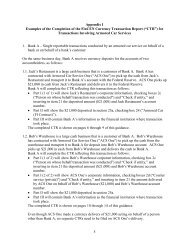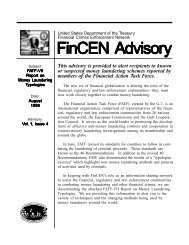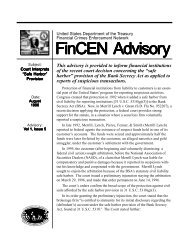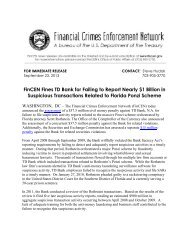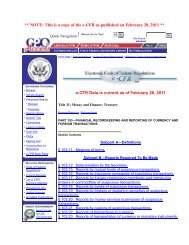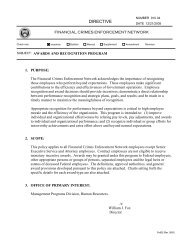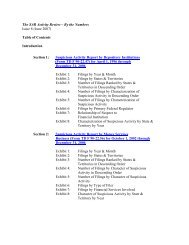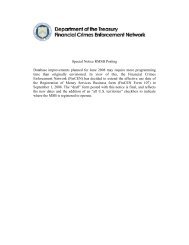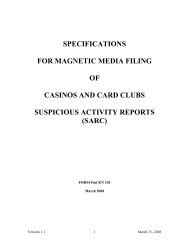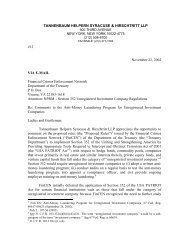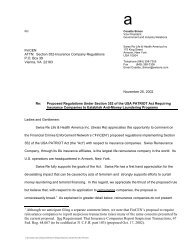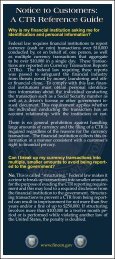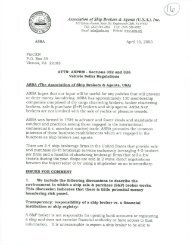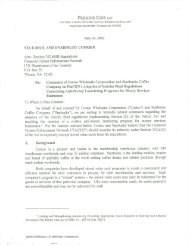The SAR Activity Review Issue 12 - FinCEN
The SAR Activity Review Issue 12 - FinCEN
The SAR Activity Review Issue 12 - FinCEN
Create successful ePaper yourself
Turn your PDF publications into a flip-book with our unique Google optimized e-Paper software.
Section 5 – Industry Forum<br />
In each issue of <strong>The</strong> <strong>SAR</strong> <strong>Activity</strong> <strong>Review</strong>, representatives from the financial<br />
services industry offer insights into some aspect of compliance management or<br />
fraud prevention that presents their view of how they implement the BSA within<br />
their institutions. <strong>The</strong> Industry Forum section provides an opportunity for the<br />
industry to share its views. <strong>The</strong> information provided may not represent the<br />
official position of the U.S. Government.<br />
Suspicious <strong>Activity</strong> Reporting <strong>Issue</strong>s Confronting<br />
the Money Services Business Industry<br />
By George R. Brown V<br />
Merle, Brown & Nakamura, P.C. for the<br />
National Money Transmitters Association<br />
Money service businesses have been required to file <strong>SAR</strong>s for over five years<br />
now. Even before this requirement, many MSBs were already filing <strong>SAR</strong>s on a<br />
voluntary basis. Money transmitters are a large subset of MSBs that are heavily<br />
regulated on both the state and federal levels.<br />
Due to the nature of this business and the lack of federal licensing requirements,<br />
onerous and detailed state regulations have developed that require money<br />
transmitters to obtain state issued licenses before they are permitted to engage<br />
in business in a state. Almost every state has such a licensing requirement. In<br />
this state licensing process, the money transmitters are almost always required<br />
to demonstrate, among many other things, a compliance program that ensures<br />
<strong>SAR</strong> filings will be made when required and all other federal compliance issues<br />
are addressed.<br />
One method of engaging in business as a money transmitter is to become an<br />
authorized representative of another money transmitter. Basically, an authorized<br />
representative sells another money transmitter’s product (money transfer<br />
services) on behalf of the other money transmitter. In most cases, the authorized<br />
representative does not have a license and is specifically permitted by state law<br />
to engage in business as a money transmitter without a license because they<br />
are acting as an authorized representative of another money transmitter who in<br />
fact possesses the required state licensing. When a licensed money transmitter<br />
engages in business through authorized representatives, the licensee is required to<br />
demonstrate to the state licensing authorities that the authorized representatives<br />
are fully integrated into the money transmitter’s <strong>SAR</strong> compliance program and are<br />
independently meeting their <strong>SAR</strong> compliance requirements as well.



